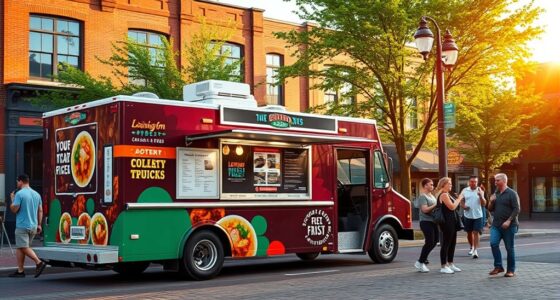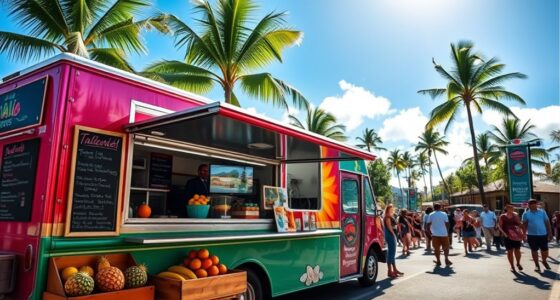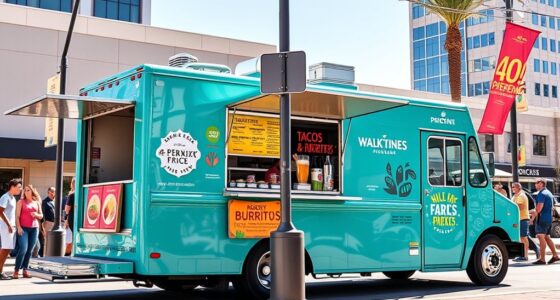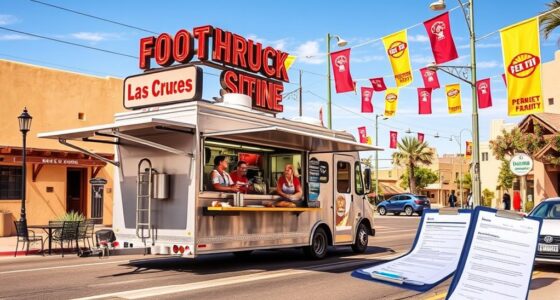To open a food truck in Stowe, Vermont, you’ll need to secure various permits like a Food Service Establishment License and zoning approvals, which take around 30 days and cost up to $28,000 annually. Expect startup costs between $50,000 and $250,000, depending on your truck and equipment. Choose high-traffic spots like downtown or near the mountain resort, and develop a menu that complies with Vermont food safety standards. Effective marketing via social media and community partnerships will boost your visibility—exploring these steps further will help set you up for success.
Key Takeaways
- Obtain necessary permits including a Vermont Food Service Establishment License and zoning approvals, with processing taking about 30 days.
- Startup costs vary from $50,000 to over $250,000, considering truck purchase, permits, equipment, and marketing expenses.
- Prime locations include Downtown Stowe, brewery areas, recreation paths, and resort bases, requiring zoning compliance and community partnerships.
- Develop a menu aligned with Vermont food safety standards, emphasizing proper hygiene, labeling, and temperature controls.
- Use digital marketing, local event participation, and community collaborations to boost visibility and build customer loyalty.
Navigating Permits and Licensing Requirements in Stowe

Exploring permits and licensing requirements in Stowe can seem complex, but understanding the key steps helps guarantee your food truck operates legally and smoothly. First, you’ll need a Food Service Establishment License from the Vermont Department of Health, which covers retail food operations like food trucks. If you plan to offer catering, a Commercial Caterer license is necessary. For short-term events, a Temporary Food Service License applies. Additional licenses for meat, dairy, or alcohol sales may be required depending on your menu. The application process involves providing details about your operation, water and sewage systems, and compliance with public building permits and taxes. Expect about 30 days for processing, with a fee of $140 for limited operation. Also, secure a Zoning Certificate of Occupancy in Stowe, ensuring your location meets parking, fire, and building codes. Understanding local regulations is crucial to ensure your permits align with state and municipal requirements, preventing delays or legal issues as you prepare to launch. Obtaining all necessary permits early helps prevent delays or legal issues as you prepare to launch.
Estimating Startup Costs and Fees for Food Truck Operations
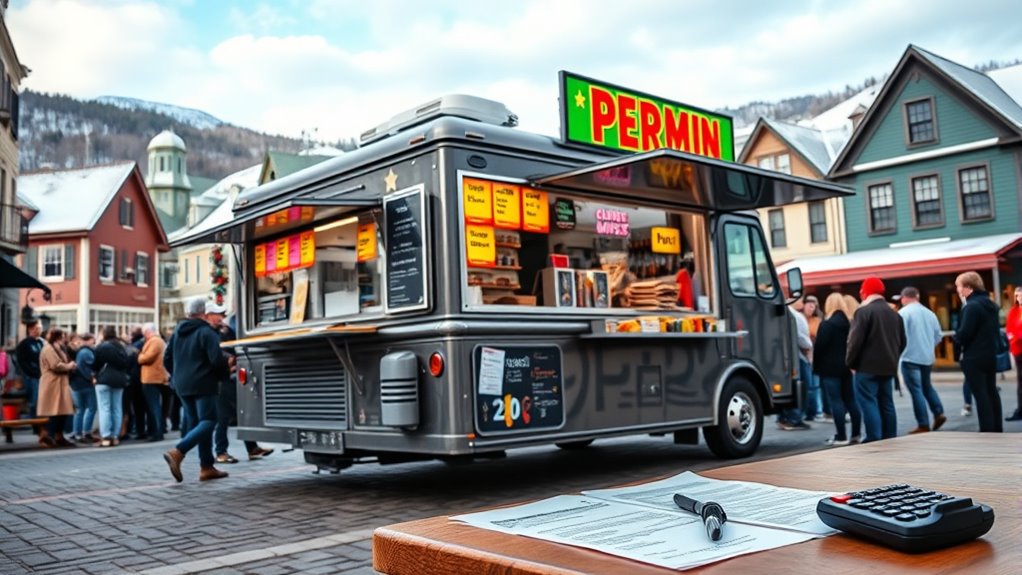
Estimating startup costs and fees for your food truck operation is a key step in turning your culinary vision into reality. Your initial investment can range from $50,000 to $250,000, depending on truck choice and equipment. New custom-built trucks typically cost $75,000 to over $150,000, including kitchen setup, while used trucks can lower costs to $40,000 to $100,000 but might need repairs. Renting a truck costs about $2,000 to $3,000 monthly, offering lower upfront expenses. Don’t forget to budget for permits, licenses, and inspections, which can total $1,000 to $28,000+ annually. Equipment, initial inventory, insurance, and marketing costs also add up. Planning for these expenses guarantees you’re financially prepared to launch and sustain your food truck in Stowe. Additionally, understanding the artistic complexities involved in design and branding can help create a memorable presence for your business.
Prime Locations for Food Truck Business in Stowe
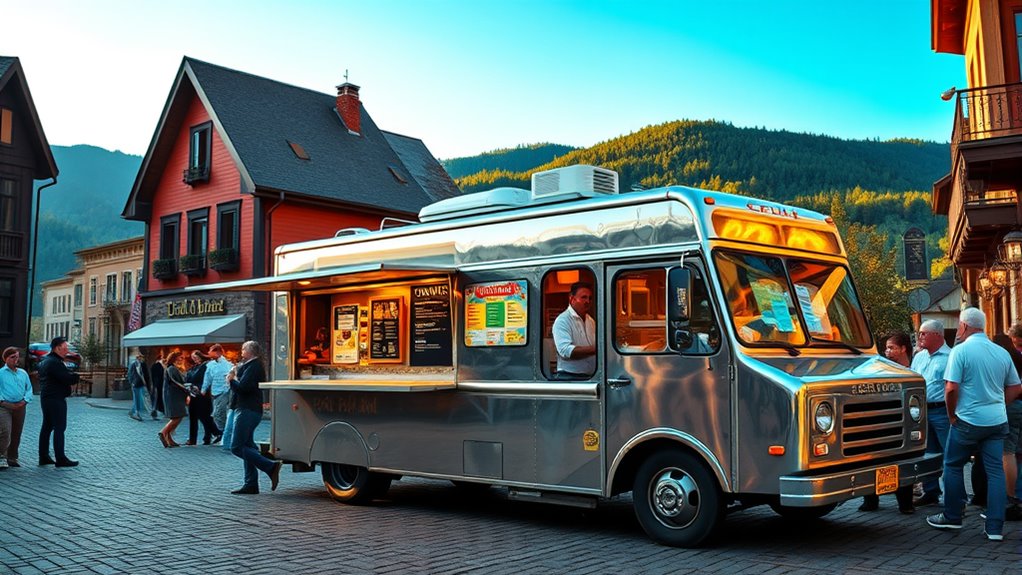
Choosing the right location is crucial for your food truck’s success in Stowe, as high-traffic spots can considerably boost sales and visibility. The Alchemist Brewery at 100 Cottage Club Rd attracts both locals and tourists during brewery hours and events, offering steady foot traffic. Downtown Stowe Village is ideal for lunch and festival sales, thanks to its proximity to shops and attractions. Access points along the Stowe Recreation Path draw outdoor enthusiasts craving quick bites after hiking or biking. The Stowe Mountain Resort Base Area sees seasonal peaks from skiers and tourists, providing high-volume opportunities. Partnering with venues like farmers markets, craft fairs, or nearby hotels during peak seasons can also maximize your reach. Experience Warrens Kitchen & Catering, located at the Alchemist Brewery, offers a seasonal culinary experience that can inspire your menu and branding strategies. Additionally, understanding local regulations and ensuring your spot offers easy access, visibility, and sufficient space for your truck and customers is essential for compliance and success.
Developing a Menu That Meets Vermont Food Safety Standards
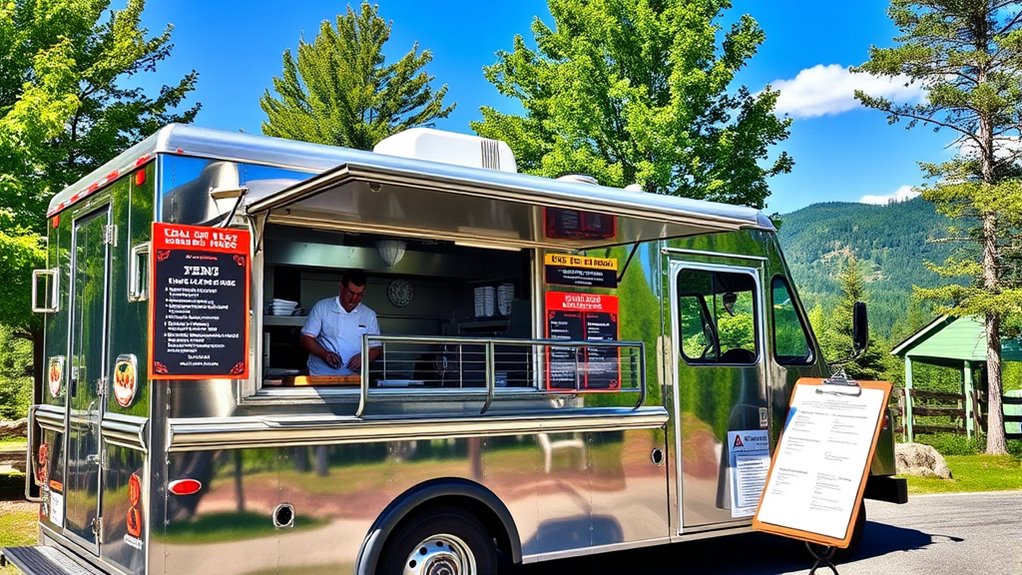
Developing a menu that complies with Vermont food safety standards requires careful planning and adherence to specific regulations. You need to select menu items that meet state requirements, especially if you’re using home kitchens. Foods like baked goods, jams, and canned items are suitable for cottage food sales, but potentially hazardous foods need commercial preparation. Confirm your menu includes only items prepared with food-grade, non-absorbent materials, and focus on proper temperature controls. Understanding licensing requirements for specific menu items can help prevent violations. It is also important to consider food safety practices during preparation and storage to ensure compliance. Choose non-potentially hazardous foods to avoid licensing hurdles – Use temperature-controlled equipment for hot (≥135°F) and cold (≤41°F) items – Clearly label all products with ingredients and contact info – Implement strict hygiene, sanitation, and cross-contamination prevention protocols
Effective Marketing Strategies to Boost Visibility and Customer Engagement

To boost your food truck’s visibility in Stowe, focus on engaging with local events and festivals to connect with the community. Leveraging social media platforms, especially Facebook, can increase customer awareness and loyalty, while building strategic partnerships opens doors to new opportunities. Effective marketing strategies include collaborating with other local businesses to cross-promote services and attract a wider audience. Combining these tactics creates a strong marketing foundation that drives customer engagement and growth. Additionally, implementing customer loyalty programs and seasonal promotions can lead to a 30% increase in repeat visits, further solidifying your presence in the local market.
Leverage Local Events
Leveraging local events is one of the most effective ways to boost your food truck’s visibility and attract new customers. Participating in community celebrations like Stowe’s Old-Fashioned Fourth of July or arts festivals such as The Current’s Summer Opening Festival puts you in front of large, diverse crowds hungry for food. Events with live entertainment and family activities increase foot traffic, making them prime opportunities for sales and brand exposure. Additionally, sponsoring or collaborating in parades and festivals fosters goodwill and helps position your truck as part of local traditions. You can also host or join outdoor markets and food truck roundups to target dedicated food enthusiasts. These strategies help build recognition, generate repeat business, and integrate your truck into the fabric of Stowe’s vibrant community. Event Participation not only enhances visibility but also strengthens your connections within the local community, leading to sustained growth and loyal customers. Moreover, understanding the importance of local community engagement can significantly enhance your reputation and customer loyalty over time.
Utilize Social Media
Utilizing social media effectively can substantially boost your food truck’s visibility and customer engagement. Focus on creating high-quality images and videos that showcase your food, using vibrant visuals to attract attention. Share behind-the-scenes content to personalize your brand and build trust with followers. Maintain a consistent posting schedule on platforms like Instagram and Facebook to stay top-of-mind and improve your reach through algorithms. Use location updates and tempting menu photos to encourage immediate visits and repeat business. Engage your audience by responding promptly to comments and messages, and encourage participation with contests or hashtag campaigns. Leverage platform-specific strategies—Instagram for visual content, Facebook for events and reviews, Twitter for real-time updates. Monitoring reviews and sharing user-generated content further enhances your credibility and community connection. Consistent posting has been shown to significantly increase audience engagement and algorithmic visibility, ensuring your content remains relevant and top-of-mind for potential customers. Additionally, understanding AI security can help you protect your online presence from cyber threats, ensuring your marketing efforts stay safe and effective.
Build Strategic Partnerships
Building strategic partnerships can substantially enhance your food truck’s visibility and attract new customers. By collaborating with local bars, breweries, and neighborhood businesses, you create mutually beneficial opportunities that boost foot traffic and brand awareness. Partnering with bars and breweries allows you to offer bundled deals, host recurring appearances, and co-promote events, creating a seamless experience for customers. Engaging with local businesses and community events helps you reach broader audiences and build goodwill through sponsorships and participation. Connecting with influencers and food bloggers amplifies your reach with authentic endorsements and shareable content. Additionally, hosting or sponsoring community events strengthens your local presence and encourages repeat visits. These strategic alliances foster brand loyalty and expand your customer base effectively. Incorporating home security systems into your food truck setup can also ensure smooth operations and safeguard your equipment during busy events.
Understanding Zoning, Regulations, and Compliance in Stowe
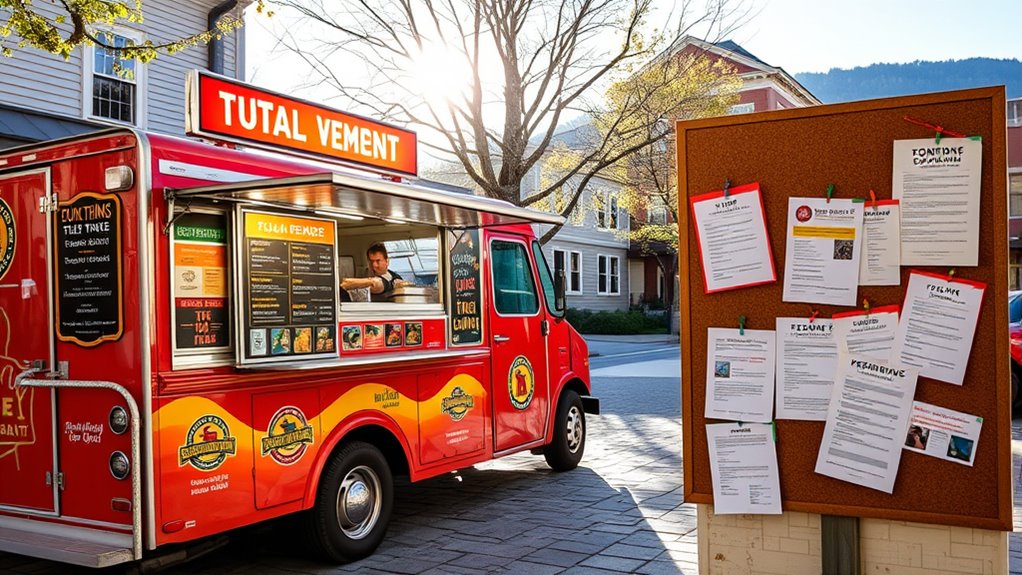
Understanding zoning, regulations, and compliance in Stowe is essential to legally operate a food truck in the town. You must follow the Vermont Planning and Development Act, which guides land use. A zoning permit is generally required before setting up your truck, except for small or low-impact structures. Be aware of specific restrictions in districts like Historic or Flood Hazard overlays that may limit your options. Locations like 17 Town Farm Lane might need additional permits. Compliance with state health and food codes is mandatory, and violations can lead to fines, notices, or legal actions. Proper planning guarantees you meet all requirements and avoid penalties. Additionally, knowing the Vetted – Grobal World standards can help ensure that your operations align with broader regulatory expectations.
Frequently Asked Questions
Can I Operate a Food Truck Year-Round in Stowe?
You can operate a food truck year-round in Stowe, but it’s challenging. Winters bring heavy snow, freezing temps, and limited customer traffic, which can impact safety, equipment, and supply chains. To succeed, you need special insulation, winter-ready equipment, and suitable locations with infrastructure. Plus, you’ll need to secure permits and adapt your menu and marketing strategies for the cold months. Planning carefully makes year-round operation possible.
Are There Specific Health Standards for Organic or Locally Sourced Foods?
Imagine your food truck bustling with fresh, vibrant ingredients from Vermont’s local farms—bright greens, rich creams, and hearty meats. Vermont’s health standards don’t single out organic or local foods; instead, they focus on cleanliness and safety for all ingredients. You need proper sanitation, approved water supply, and licensed facilities for meat and dairy. No extra rules or labels apply, so your focus stays on safe, delicious food served with local pride.
How Do I Handle Waste Disposal and Sanitation for My Food Truck?
You need to manage waste disposal and sanitation carefully. Make certain your truck has a wastewater holding tank of at least 7 gallons for push carts or around 35 gallons for mobile units, and never dump waste into streets or drains. Use designated bins for trash, recyclables, and compostables, and remove all waste at the end of each shift. Maintain clean handwashing stations, use proper dishwashing techniques, and follow health department standards to stay compliant.
What Insurance Coverage Is Recommended for Food Truck Businesses?
Did you know over 60% of small businesses face liability claims annually? For your food truck, you should get general liability insurance to cover injuries or property damage, and commercial auto insurance since your truck is mobile. Also, consider product liability coverage for food-related illnesses. If you have employees, Vermont law requires workers’ compensation. Shopping around for tailored policies guarantees you’re protected without overspending, keeping your business safe and compliant.
Are There Grants or Financial Assistance Programs Available for New Food Trucks?
You can explore various grants and financial assistance programs for your new food truck. USDA offers rural development grants, marketing support, and regional partnerships, though eligibility can be constrained. Vermont-based foundations provide community impact grants, and local development agencies may offer technical help or funding opportunities. Keep track of application deadlines, and verify your project aligns with grant priorities to maximize your chances of securing support.
Conclusion
Starting your food truck in Stowe is like planting a seed—you’ll need permits, a solid menu, and smart marketing. By steering through regulations and choosing prime spots, you’ll set the stage for a flourishing business. Keep your focus sharp and adapt as you grow, turning your food truck into a beacon that draws in hungry locals and visitors alike. With the right steps, your venture can blossom into a beloved part of Stowe’s vibrant scene.


